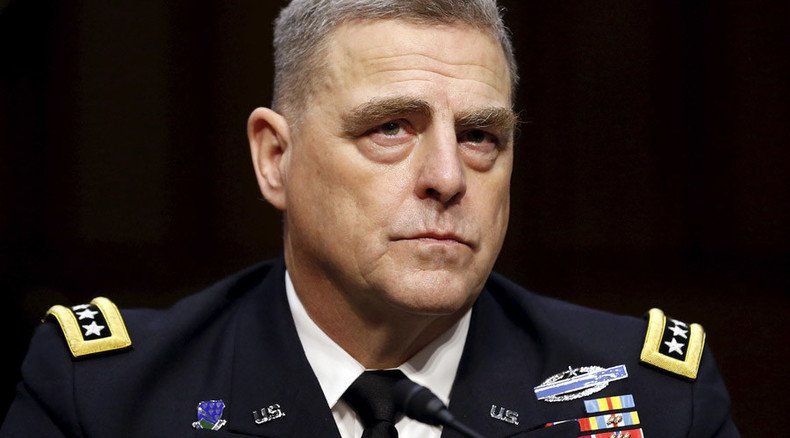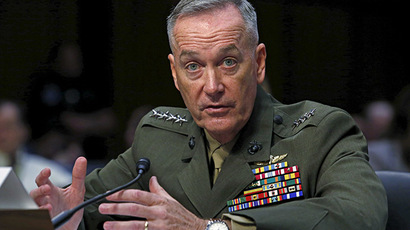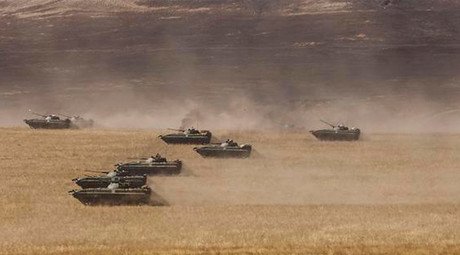Top army general calls Russia ‘#1 threat’ to US

Fresh back from Kiev, Army Chief of Staff General Mark Milley called Russia “aggressive” and “adversarial to the interests of the United States,” claiming that having nuclear weapons and the ability to use them makes Russia the foremost threat to the US.
Russia is the only country in the world with the nuclear capability to destroy the United States, which makes it an existential threat, Milley told the audience at the Defense One summit in Washington, DC on Monday. Moscow’s recent behavior suggested that Russia would be willing to use such weapons, the general added, saying that Russia has been violating “the Westphalian order” since about 2008 by “invading sovereign nations.”
Based on capability and intent Russia is the greatest threat to the US
@GENMarkMilley#DefOneSummit2015pic.twitter.com/KmssXQeRUJ
— Lovisa (@LovisaInserra) November 2, 2015If that sounds familiar, that’s because Milley used the exact same phrases during his confirmation hearing before the US Senate this July. The only difference is that he wore a blue service uniform then, and chose a camouflage combat uniform (ACU) for his conference appearance Monday.
What’s more, the phrasing most likely was not even his own: Two weeks prior to Milley’s confirmation hearing, General James Dunford used the exact same language at his own Senate confirmation hearing for the post of Chairman of the Joint Chiefs of Staff. Dunford previously commanded the US Marine Corps.
“I would say that Russia’s recent behavior is adversarial to the interests of the United States,” Milley said, citing “aggressive” exercises and patrols by Russian aircraft, submarines and troops – inside Russia – for the past “four-five-six-seven” years.
“Russia bears close watching,” the general added.
how come Russia is putting its border right beside our NATO bases? Are they trying to start WW3? #AskPOTUSpic.twitter.com/91NlutrCI0
— Mr. (@Tarshatha) July 2, 2015When asked whether this means Russia should be treated like a foe and not a partner, Milley executed a fighting retreat, urging a “strength and balance sort of approach, which is our current policy.”
Diplomacy is a “bit more nuanced” than a binary calculation, he noted. While Russian “aggression” should be fought with sanctions and NATO posturing, the US should work with Moscow on matters of mutual interest and convenience, such as the Iran nuclear deal.
This just happens to be the official party line of the Obama administration, as espoused by Secretary of State John Kerry, Secretary of Defense Ash Carter, and President Barack Obama himself on a number of occasions.
"War is a political act," Milley says, making the 3rd Clausewitz reference of the night #defonesummit15https://t.co/BuIopBrUrA
— Kedar Pavgi (@KedarPavgi) November 2, 2015Between the talking points and clichés, such as “Freedom isn’t free,” Milley leavened his presentation with references to the army’s favorite book on military philosophy, On War, which was written almost two centuries ago by Prussian officer Carl von Clausewitz. The unfinished book was published in 1832, following Clausewitz’s death during a cholera outbreak.
Though many of his observations have been questioned since, and others grown into truisms from overuse, Clausewitz at least knew a thing or two about Russians, having fought alongside them against Bonaparte in the Napoleonic wars.
Weird that Milley responds to "Could US Army beat Russia?" with anything except "sure, but nuclear war means we all lose" #DefOneSummit2015
— Kelsey D. Atherton (@AthertonKD) November 2, 2015Instead of honoring the Pentagon tradition of treating his audience to a PowerPoint presentation, Milley offered canned responses to questions from Fox News defense analyst Jennifer Griffin.
One of Griffin’s remarkably insightful inquiries was whether the US could defeat Russia in a ground war.
“Our capabilities today are plenty good enough to deal with anything that Russia has,” Milley retorted, ignoring his own words about Russia’s nuclear capabilities.
Milley had the unenviable job of arguing that the US Army was not “hollow” and could do everything asked of it, while at the same time pleading for more funding, troops and gear.
“To maintain our way of life, to maintain a military that protects that way of life, is a very expensive endeavor,” he said.
US chief of staff of the Army and US Ambassador @GeoffPyatt visit #FearlessGuardian training site in #Yavorivpic.twitter.com/zEyOjneXm8
— U.S. Embassy Kyiv (@USEmbassyKyiv) October 30, 2015The general had just come back from Ukraine, where he had been visiting US troops who are teaching the Kiev forces “human rights and use of force.”
LISTEN MORE:














